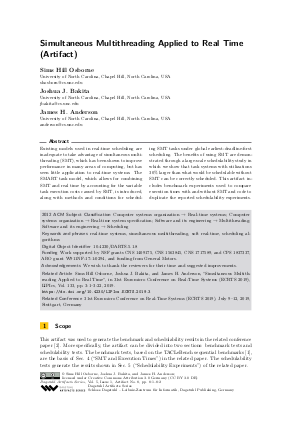Simultaneous Multithreading Applied to Real Time (Artifact)
Authors Sims Hill Osborne, Joshua J. Bakita, James H. Anderson
-
Part of:
Issue:
Special Issue of the 31st Euromicro Conference on Real-Time Systems (ECRTS 2019)
Part of: Volume: DARTS, Volume 5 (ECOOP 2019)
Part of: Conference: Euromicro Conference on Real-Time Systems (ECRTS)
Part of: Journal: Dagstuhl Artifacts Series (DARTS) - License:
 Creative Commons Attribution 3.0 Germany license
Creative Commons Attribution 3.0 Germany license
- Publication Date: 2019-07-08
Artifact Description

PDF
DARTS.5.1.8.pdf
- Filesize: 306 kB
- 2 pages
Document Identifiers
Subject Classification
ACM Subject Classification
- Computer systems organization → Real-time systems
- Computer systems organization → Real-time system specification
- Software and its engineering → Scheduling
- Software and its engineering → Multithreading
Keywords
- real-time systems
- simultaneous multithreading
- soft real-time
- scheduling algorithms
Metrics
- Access Statistics
-
Total Accesses (updated on a weekly basis)
0PDF Downloads0Metadata Views
Abstract
Existing models used in real-time scheduling are inadequate to take advantage of simultaneous multithreading (SMT), which has been shown to improve performance in many areas of computing, but has seen little application to real-time systems. The SMART task model, which allows for combining SMT and real time by accounting for the variable task execution costs caused by SMT, is introduced, along with methods and conditions for scheduling SMT tasks under global earliest-deadline-first scheduling. The benefits of using SMT are demonstrated through a large-scale schedulability study in which we show that task systems with utilizations 30% larger than what would be schedulable without SMT can be correctly scheduled. This artifact includes benchmark experiments used to compare execution times with and without SMT and code to duplicate the reported schedulability experiments.
Cite As Get BibTex
Sims Hill Osborne, Joshua J. Bakita, and James H. Anderson. Simultaneous Multithreading Applied to Real Time (Artifact). In Special Issue of the 31st Euromicro Conference on Real-Time Systems (ECRTS 2019). Dagstuhl Artifacts Series (DARTS), Volume 5, Issue 1, pp. 8:1-8:2, Schloss Dagstuhl – Leibniz-Zentrum für Informatik (2019)
https://doi.org/10.4230/DARTS.5.1.8
BibTex
@Article{osborne_et_al:DARTS.5.1.8,
author = {Osborne, Sims Hill and Bakita, Joshua J. and Anderson, James H.},
title = {{Simultaneous Multithreading Applied to Real Time}},
pages = {8:1--8:2},
journal = {Dagstuhl Artifacts Series},
ISSN = {2509-8195},
year = {2019},
volume = {5},
number = {1},
editor = {Osborne, Sims Hill and Bakita, Joshua J. and Anderson, James H.},
publisher = {Schloss Dagstuhl -- Leibniz-Zentrum f{\"u}r Informatik},
address = {Dagstuhl, Germany},
URL = {https://drops.dagstuhl.de/entities/document/10.4230/DARTS.5.1.8},
URN = {urn:nbn:de:0030-drops-107362},
doi = {10.4230/DARTS.5.1.8},
annote = {Keywords: real-time systems, simultaneous multithreading, soft real-time, scheduling algorithms}
}
Author Details
Funding
Work supported by NSF grants CNS 1409175, CNS 1563845, CNS 1717589, and
CPS 1837337, ARO grant W911NF-17-1-0294, and funding from General Motors.
Acknowledgements
We wish to thank the reviewers for their time and suggested improvements.
Artifact
DARTS-5-1-8-artifact-E83E1ED15EEA76F1E323D757B42D8AB8.tgz
(Filesize: 23.31 MB)
MD5 Sum:
e83e1ed15eea76f1e323d757b42d8ab8
(Get MD5 Sum)
Related Article
- Sims Hill Osborne, Joshua J. Bakita, and James H. Anderson, "Simultaneous Multithreading Applied to Real Time", in 31st Euromicro Conference on Real-Time Systems (ECRTS 2019), LIPIcs, Vol. 133, pp. 3:1 - 3:22, 2019. https://dx.doi.org/10.4230/LIPIcs.ECRTS.2019.3
References
-
H. Falk, S. Altmeyer, P. Hellinckx, B. Lisper, W. Puffitsch, C. Rochange, M. Schoeberl, R. B. Sorensen, P. Wagemann, and S. Wegener. TACLeBench: A Benchmark Collection to Support Worst-Case Execution Time Research. In WCET 2016, pages 2:1-2:10, 2016.

-
S. Osborne, J. Bakita, and J. H. Anderson. Simultaneous Multithreading Applied to Real Time. In ECRTS '19, 2019.

